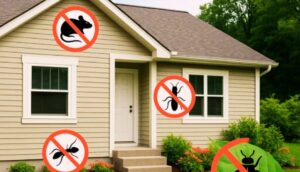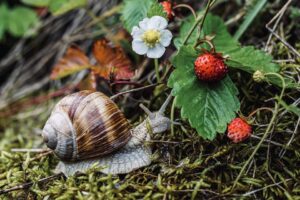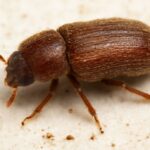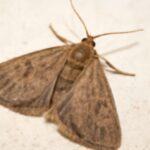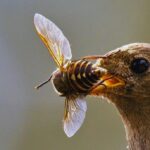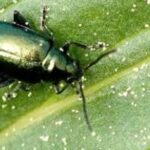Proven Methods to Control Aphids

Aphids are tiny soft-body insect pests that are most active during the spring and fall months although they may be seen during the summer months, these tiny pared-shaped insects do damage by piercing the plant’s tissues with their piercing-sucking mouthparts followed by extracting the plant’s juice or fluids. Aphids love the tender shoots or new growth of plants where they congregate and do their damage, young flower buds that have not opened are also susceptible to aphid attack. Aphids can be found on the underside of leaves, developing stems, barks, twigs, and roots.
Aphids Biology
Aphids produce several generations per year, most aphids reproduce asexually or without mating. Adult females give birth to live immature aphids called nymphs. The nymphs are wingless and molts shedding their skin multiple times, before becoming adults.
The adult female deposits several nymphs on tender plant tissues, before flying to a new plant, nymphs feed on the plant sap molt and increase in size. The nymphs mature in 7-10 days and are capable of producing living young.
How to Identify Aphids
Aphids have two tailpipes (cornicles) found at the end of their abdomen. Many species are green but some are black, yellow, white, red (pink), mottled, or brown.
Signs of Aphid Damage
Signs of aphid damage include plant leaves that are curled and twisted, shoots that are stunted or dead, poor plant growth, and yellow leaves. Aphids may transmit viruses between plants. The leaves and the stems may also be covered with a sticky substance known as honeydew. This sticky substance is sugary and is used by ants for food, ants that are found in great numbers on garden plants may also be another indication of aphid infestation. Some aphid species cause galls to form on the plant’s leaves or roots, The flowers and the fruits of plants can become deformed or distorted
How to Control Aphids
- Aphids are among the easiest of garden insect pests to eliminate, a strong spray of water from a garden hose will knock aphids off garden plants killing them.
- A solution of joy and water sprayed directly on them will eliminate them.
- Insecticidal soap sprays can be used for control.
- Beneficial insects can also bring control
- Diatomaceous earth is a non-toxic organic spray that, on making contact will dehydrate aphids
- Companion planting is an effective way to deter aphids, for example, chives, catnip, garlic, marigold, basil, lavender, petunia, etc… will control aphids because aphids hate the scent of these plants
- Horticultural oil is another effective insecticide that will bring elimination
- The use of row covers in your garden
- Keep your garden nicely weed free, since aphids can hide in weeds and then travel by the wind from weeds to get to your garden plants
Introducing Beneficial Insects in Your Garden
Introducing beneficial insects in your garden is also a natural way to bring control, beneficial are predators to garden insect pests using them as food.
Controlling Aphids on Indoor Plants
Aphids can also be found on indoor plants, implementing these control measures will bring elimination.
- The use of dish liquid and water, 2 teaspoons to a gallon of water or one tablespoon of dish liquid to a gallon of water. Thoroughly mix this solution by shaking well then add solution to a 32 0z spray bottle. Adjust the nozzle so that the spray comes out fine and misty for total coverage, spray both the top and the undersides of the plant leaves. The stems may need to be treated as well if aphids are spotted in this area.
- Chemical control would include, insecticidal soap, neem oil
Before treating plants with chemicals read and follow the manufacturer’s directions for the best results.
Other Sucking Garden Insect Pests
10 Frequently Asked Questions (FAQs)
1. What are aphids, and why are they a problem in my garden?
Aphids are tiny, soft-bodied insects that love to suck the sap out of plants. They’re not just annoying — they can cause leaves to curl, stunt plant growth, and even spread diseases. If you see a bunch of sticky leaves or ants hanging around your plants, aphids might be the sneaky culprits.
2. How do I know if my plants have aphids?
Great question! Look for clusters of small green, black, or white bugs on the undersides of leaves or stems. Leaves might look twisted, yellow, or sticky from the “honeydew” aphids leave behind. If you see ants, they’re often a sign that aphids are nearby — ants actually protect aphids in exchange for their sweet honeydew!
3. Will aphids kill my plants?
While aphids usually don’t kill mature plants outright, they can seriously weaken them. Young seedlings or stressed plants are especially vulnerable. Over time, heavy infestations can stunt growth, reduce blooms, and make plants more likely to catch other diseases.
4. What’s the easiest way to get rid of aphids naturally?
One of the quickest DIY tricks is to blast them off with a strong stream of water from your garden hose. It knocks them off the plant and makes it harder for them to climb back. Just be gentle if you’re dealing with delicate plants!
5. Are there any bugs that eat aphids?
Absolutely! Ladybugs, lacewings, and parasitic wasps are all-natural predator’s or assassins of aphids. You can attract these beneficial bugs by planting flowers for example dill, fennel, or marigolds, or even purchase ladybugs online and release them into your garden.
6. Can I use dish soap to kill aphids?
Yes, but do it the right way. Mix thoroughly a few drops of mild liquid dish soap (not antibacterial or degreasing kinds) with water in a spray bottle. Spray it directly on the aphids. The soap breaks down their outer coating, but don’t overdo it — too much soap can stress your plants.
7. What are some organic sprays that work on aphids?
Neem oil, insecticidal soap, and homemade garlic or chili sprays are great organic options. Neem oil not only kills aphids but also disrupts their reproduction. Just remember to spray early in the morning or late afternoon to avoid harming good bugs or burning your plants in the sun.
8. How can I prevent aphids in the first place?
Start with healthy soil and happy plants — stressed plants attract pests. Rotate crops, remove weeds, and don’t over-fertilize (aphids love nitrogen-rich new growth). Companion planting with herbs like basil, chives, or catnip can also help keep aphids at bay.
9. Are aphids more common at certain times of the year?
Yes! Aphids seem to be most active during spring and early summer when plants are actively growing. But in warmer climates, they can hang around all year. Keeping an eye on your garden during these peak seasons can help you catch an infestation early.
10. Do I need to worry about aphids if I grow plants indoors?
Definitely — aphids can hitch a ride on newly installed plants or even gain access through open windows. Indoor plants aren’t immune! Check your houseplants regularly, especially if you bring them in from outdoors or purchase new ones from the store.
Conclusion
Aphids are a sucking insect pest that can be controlled, these garden pests can do damage if left alone or neglected, the good is aphids can be controlled by putting the proper maintenance practices in place. Encourage healthy garden plants that will go to work for you with their display of beautiful flower blooms.



